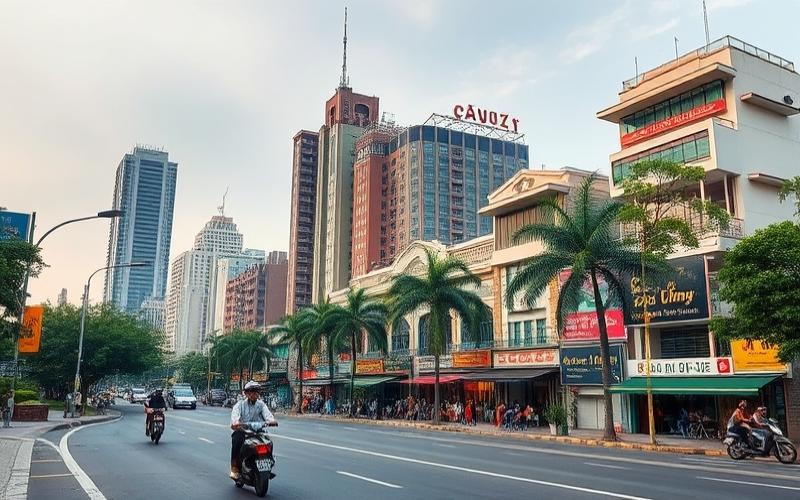
 Published on and written by Cyril Jarnias
Published on and written by Cyril Jarnias
The Real Estate Purchase Process in Vietnam
Navigating Vietnam’s real estate purchase process can be a complex undertaking without thorough knowledge of the essential roles of notaries and associated notary fees. In this rapidly developing country, where real estate is increasingly attracting investors, skillfully maneuvering through the nuances of the local legal framework is crucial.
Guide to Notary Services in Vietnam
This article provides a detailed guide to familiarize you with the key features of notary services in Vietnam and their financial implications, enabling you to make informed and strategic decisions during your investments.
Good to Know:
Notaries play a central role in securing real estate transactions in Vietnam by verifying the legality of documents and registering deeds.
Understanding the Notary’s Role in Real Estate Purchases in Vietnam
Key Real Estate Purchase Steps Requiring Notary Involvement in Vietnam:
- Verification of the “pink book” (official ownership certificate) and land titles from the seller.
- Drafting, translation (into Vietnamese/English) and notarial certification of the sales contract.
- Official signing at the notary office with all parties present.
- Registration of the transaction with local authorities.
Legal Role of the Notary in Real Estate Transactions:
The notary plays a central role in legally securing all real estate transactions in Vietnam. Their duties include:
- Thorough verification of all legal documents related to the property (titles, history, absence of mortgage or disputes).
- Formal confirmation that the seller is indeed the holder of the pink book (authentic certificate issued by the Vietnamese government).
- Drafting or validation of the contract in compliance with Vietnamese law and its formal requirements (bilingual if necessary).
- Official certification (“notarization”) that gives legal force to documents signed before them.
| Step | Notary Involvement Required? | Details |
|---|---|---|
| Pink Book Verification | Yes | Comprehensive legal analysis to guarantee no obstacles to the sale. |
| Document Drafting/Certification | Yes | Contract must be drafted/compliant in Vietnamese, sometimes translated into English – notary signature required. |
| Official Transfer | Yes | Transfer is only effective after official signing and notarial certification; then filed with administrative authorities. |
Specific Notarial Procedures in Vietnam:
- Preliminary Document Review
- Notary’s exhaustive examination of land titles, cadastral records, possible administrative permits.
- Bilingual Preparation/Drafting
- Requirement for foreign parties to have a certified translated version if they don’t speak Vietnamese.
- Formal Signing
- Deed signed before the notary in their office; each party must present valid ID and long-stay visa if foreign.
- Certification/Notarization
- Application of official seal on the deed giving immediate legal validity to the transaction.
- Public Registration
- Transmission by notary office to competent administrative services for final entry in public records.
Security Provided to Buyers/Sellers
The mandatory notary process:
- Guarantees all documents comply with the law and are authentic
- Protects against any fraud attempts or double sales
- Legally secures both buyer and seller
Associated Notary Fees and Calculation Method:
Fees generally vary according to:
- The total declared value in the deed
- Administrative complexity
In practice:
| Type | Indicative Amount |
|---|---|
| Fixed Fees | Between 0.03% – 0.15% according to national scale applied to actual/negotiated value |
| Certified Translation | Variable additional cost |
These fees often include:
- Land registration tax: ~0.5%
- VAT on commercial housing: up to 10%
These fees are typically shared or negotiated between buyer/seller during preliminary agreements.
Practical Tips for Choosing a Good Notary in Vietnam:
- Prefer an office duly licensed by the Vietnamese state (“Cong chứng”), with solid experience in international real estate.
- Ensure they master your language or work with a locally recognized certified translator.
- Always request a detailed written estimate before any financial commitment;
- Consult multiple notary offices to compare prices/services;
- Look for recent client reviews or recommendations through expatriate communities/local professionals;
To maximize your legal security when purchasing real estate in Vietnam, always go through a licensed professional, demand all document verifications, sign exclusively before an authorized public officer – this is an essential guarantee against any future risk!
Good to Know:
In real estate purchases in Vietnam, the notary plays a crucial role at several key stages, such as document verification and legal compliance of the transaction. The procedure begins with the notary’s thorough examination of property titles to ensure they are free of disputes or irregularities. Then, the notary drafts and certifies the sales contract, thereby guaranteeing the legal security of the operation for both parties. Notary fees in Vietnam are generally calculated based on a percentage of the transaction value, often around 0.5% to 1%, plus fixed fees for document processing. It’s essential to choose a competent and licensed notary who is familiar with the specifics of the Vietnamese real estate market and to compare several options before making your selection to ensure quality service. For deeper insight, a consultation with a notary can reveal practical tips and contextualized advice based on the region where the purchase is planned.
Notary Fees: What Costs to Expect When Buying Property in Vietnam
Notary fees in Vietnam play an essential role in the real estate purchase process: they primarily serve to authenticate contracts, guarantee transaction legality, and provide indispensable administrative services. Their importance lies in legally securing the purchase while protecting the involved parties.
The main types of notary fees a buyer can expect are as follows:
- Fixed Fees: Set amounts for certain services, like contract drafting (approximately 200,000 VND per contract), document entry or copying (20,000 VND per page or file), document storage (50,000 VND per file), and document translation (60,000 to 120,000 VND per page depending on language).
- Percentage-based Fees: Notary fees for property purchases typically represent between 0.05% and 0.10% of the property value.
- Administrative Fees: Additional costs may apply, such as registration fees (approximately 0.5%), legal fees (between 0.5% and 1%), and property transfer tax (2%).
| Fee Type | Amount or Percentage |
|---|---|
| Contract Drafting | 200,000 VND / contract |
| Document Entry | 20,000 VND / page |
| Notarized Copy | 20,000 VND / file |
| Document Storage | 50,000 VND / file |
| Translation | 60,000–120,000 VND / page |
| Notary Fees (percentage) | 0.05% to 0.10% of property |
| Registration Fees | 0.5% |
| Transfer Tax | 2% |
Regional Comparison:
- Vietnam: Low notary fees (0.05% to 0.10%), total additional costs for buyer around 2.55% to 3.10% of property value.
- Thailand: Notary fees often included in registration or transfer fees, typically between 1% and 2%.
- Indonesia: Notary fees of 0.5% to 1% of property value.
- Singapore: Much higher notary fees, often several thousand Singapore dollars.
List of Practical Tips to Anticipate These Costs:
- Establish a budget including all ancillary fees from the beginning of the purchase process.
- Request detailed quotes from notary offices and verify expense items.
- Allow for a safety margin for variable or unexpected fees.
- Inquire about possible reductions or exemptions based on transaction type or buyer status.
- Verify specific requirements for foreigners, particularly the need for an interpreter or additional documents.
Regulatory Information and Recent Developments:
- Removal of Notary Fee Cap: A recent reform (May 2025) removes regulations on fee caps, giving notary offices more freedom to set their rates, but indicative scales remain commonly applied.
- Requirements for Foreigners: For foreigners married to Vietnamese nationals, notary involvement is mandatory, sometimes with an interpreter, to certify fund origins and property rights.
- Absence of Notarial Database: Unlike France, there’s no centralized database on market prices, which can complicate fee assessment and transaction transparency.
- New Legal Obligations: Since 2024, anti-money laundering measures strengthen document verification and party identification.
Key Takeaway: Anticipating notary fees and incorporating them into your real estate purchase budget in Vietnam is essential. Recent developments make prior consultation with a professional even more important, particularly for non-residents and foreigners.
Good to Know:
In Vietnam, notary fees are an unavoidable element in real estate purchases, guaranteeing the legal security of the transaction. They typically consist of fixed fees, percentages proportional to the property value, and administrative fees, often representing 0.5% to 1% of the purchase price. Compared to other Southeast Asian countries like Thailand or Indonesia, these fees are quite competitive, but budgeting for them from the start of the purchase process is essential. Certain exemptions or reductions may apply, for example for transactions involving low-value properties or purchases by certain professional categories, according to recent 2023 regulations. It’s crucial to research these aspects thoroughly to avoid last-minute surprises and optimize the total purchase cost.
Demystifying Hidden Costs Related to Real Estate in Vietnam
Demystifying Hidden Costs When Buying Real Estate in Vietnam
Buying property in Vietnam involves numerous fees that aren’t always explicitly announced during the initial transaction. These hidden costs can significantly impact the buyer’s final budget, especially for non-residents or those new to the local market.
Main Types of Hidden Fees
Transaction-Specific Taxes
- Real Estate Transfer Tax: 2% of sale price, typically seller’s responsibility but sometimes negotiable.
- Property Registration Fee: approximately 0.5% of transaction price, payable when registering the property under the new owner’s name.
- Rental Income Tax: if the property is rented, annual taxation based on generated income.
- Annual Land Taxes: relatively low, indexed on the property’s cadastral value.
Administrative and Legal Fees
- Notary Fees: between 0.05% and 0.10% of property price.
- Legal Fees (lawyer, legal advice, translation, etc.): between 0.5% and 1% of transaction amount.
- File and Management Fees: may include costs for file preparation, property certificates, or title verification.
Maintenance and Management Costs
- Condominium or Management Fees: in apartments or secured residences, these monthly or annual fees cover common area maintenance, security, etc.
- Routine Maintenance: repairs, renovations, garden upkeep, etc.
- Home Insurance: not mandatory but highly recommended, with variable rates depending on location and property type.
Summary Table of Hidden Costs
| Cost Type | Rate or Indicative Amount | Frequency | Comment |
|---|---|---|---|
| Real Estate Transfer Tax | 2% of sale price | Per transaction | Sometimes seller’s responsibility |
| Registration Fee | 0.5% of transaction price | Per transaction | Mandatory for changing owner name |
| Notary Fees | 0.05% to 0.10% | Per transaction | |
| Legal Fees | 0.5% to 1% | Per transaction | Includes lawyer, translation, etc. |
| Annual Land Taxes | Low, varies by region | Annual | Indexed on cadastral value |
| Rental Income (tax) | Variable rate based on income | Annual | If property is rented |
| Condominium Fees | Variable (few €/m²/year) | Monthly/Annual | Depending on residence/apartment |
| Maintenance/Management | Variable | As needed | Repairs, improvements, etc. |
| Home Insurance | Variable | Annual | Optional but recommended |
Regional Cost Variations
In Ho Chi Minh City and Hanoi, administrative fees, condominium charges, and management costs are generally higher due to property values and expected service levels.
In rural or secondary regions, certain costs (particularly condominium fees and local taxation) are significantly lower, but maintenance may cost more due to limited access to certain services or materials.
Concrete Examples of Unexpected Costs
A foreign buyer in Ho Chi Minh City was charged nearly 3% additional in administrative and notary fees beyond the listed purchase price, representing several thousand unanticipated euros.
An investor in Danang discovered after the transaction the existence of annual condominium fees representing nearly 2% of the property value, not mentioned during signing.
Tips to Anticipate and Manage These Fees
- Request a detailed quote including all fees before any signing.
- Consult a local lawyer specialized in real estate to verify document compliance and anticipate ancillary costs.
- Include a safety margin of 3% to 5% of purchase price in your overall budget to absorb unexpected fees.
- Research annual charges (condominium, land taxes) and payment methods with the management board or local authorities.
- Consider future maintenance of the property in profitability calculations, especially for individual houses or villas.
Warning:
Hidden fees can represent between 2.5% and 5% of purchase price.
Poor anticipation of these costs can compromise the profitability or viability of a real estate project in Vietnam.
Anticipating these expenses helps secure your investment and avoid post-acquisition surprises.
Good to Know:
When purchasing real estate in Vietnam, it’s crucial to anticipate various hidden costs that can burden your budget, such as local taxes that differ by region, particularly local land tax which can be especially high in Ho Chi Minh City. Administrative fees, which often include charges for property registration and translation of official documents, can also represent a significant portion of expenses. Additionally, don’t neglect ongoing maintenance costs, like condominium fees for buildings, which can vary considerably from one area to another, as well as management fees if you plan to rent the property. For example, in Hanoi, monthly apartment management fees can be surprising with variations up to 30% depending on the neighborhood. In preparation, it’s advisable to consult a local notary who can help obtain a clear estimate of all costs upfront, to avoid financial inconveniences after purchase.
Disclaimer: The information provided on this website is for informational purposes only and does not constitute financial, legal, or professional advice. We encourage you to consult qualified experts before making any investment, real estate, or expatriation decisions. Although we strive to maintain up-to-date and accurate information, we do not guarantee the completeness, accuracy, or timeliness of the proposed content. As investment and expatriation involve risks, we disclaim any liability for potential losses or damages arising from the use of this site. Your use of this site confirms your acceptance of these terms and your understanding of the associated risks.











































